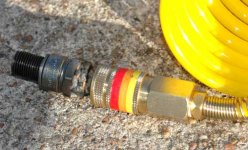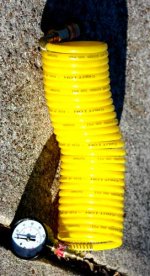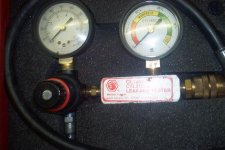Bugeye58 said:
Glad it helped, Drew. it's a simple concept, and much more precise than a simple compression test.
Jeff
Hi Jeff,
Good stuff. As you likely know, recip aircraft engines are rigorously tested in this manner. For aircraft engines, there are prescribed calibrated restrictor orifices to match the cylinder displacement. This gives an actual calibrated leakage reading that can be compared to the particular engine specs. The .040" diameter restrictor mentioned is a pretty good compromise for most engines. Sometimes, more elaborate testers use two pressure gages, but the single gage is usually more than adequate.
For folks who don't wish to be confused by a reverse reading pressure gage, or go to the trouble to make a new reversed dial face, the Moroso gage can be had for a bit more money.
https://www.pegasusautoracing.com/productdetails.asp?RecId=844
You are correct, the sparkplug end of a higher end (screw in type) compression tester works very well. It has a quick disconnect & numerous plug adapters. With the quick disconnect, it's very easy to set the pressure regulator to exactly full scale on the gage & then connect to the cylinder adapter hose.
I also agree, problems further down the cylinder can be checked, but as you say, once the piston is off TDC, the crankshaft must be securely held in position against air pressure.
I have also found the part about a speck of carbon under a valve causing leakage more than once.
Good thread, all of it. It gives far more information about engine condition & the location of problems which can not be done with the engine disassembled.
D

 Hi Guest!
Hi Guest!

 smilie in place of the real @
smilie in place of the real @
 Pretty Please - add it to our Events forum(s) and add to the calendar! >>
Pretty Please - add it to our Events forum(s) and add to the calendar! >> 



